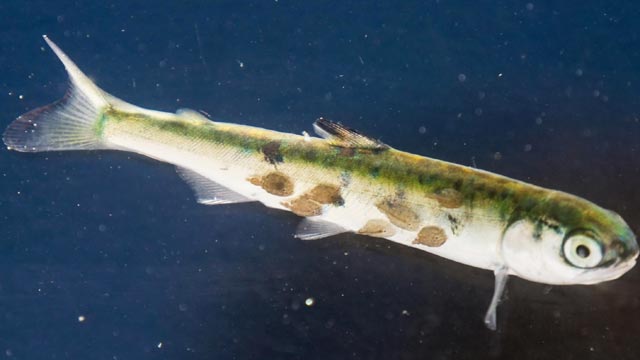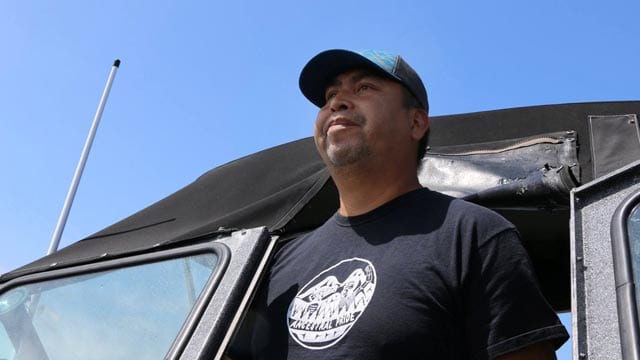(Sea lice attached to a juvenile salmon in Clayoquot Sound. Photo courtesy Alexandra Morton, May 2018)
Cermaq Canada, a salmon farming company now a fully owned subsidiary of the Mitsubushi Corporation, is dealing with a sea lice infestation using a number of methods including hydrogen peroxide.
“We are using multiple tools in the immediate term, including depopulating affected farms while treating others with an environmentally safe hydrogen peroxide bath now that we have received a licence for that approach,” says David Kiemele, the managing director of Cermaq Canada in a statement.
The outbreak is at seven of their 14 open-net farms in Clayoquot Sound on the west coast of Vancouver Island.
The infested farms are located on wild salmon migration routes, which could pose a serious threat to already low numbers of wild fish.

The company’s audits showed counts of sea lice increasing exponentially as early as January and February.
Under the federal Department of Fisheries and Oceans (DFO) regulations, salmon farms must ensure adult fish aren’t infected by more than three active sea lice. But Cermaq’s March and April reports show fish were infected by up to 30.
In an email to APTN News, DFO said “we are aware of the sea lice exceedances at Cermaq Canada’s facilities in Clayoquot and have been in ongoing discussions with the company since January 2018 about measures to reduce sea lice levels.
“The Department is reviewing Cermaq Canada’s sea lice management practices at these farms to determine if relevant licence conditions have been followed appropriately.”
Juvenile farmed salmon start out their lives still lice-free, but once in the ocean the fish are exposed to sea lice through wild salmon stocks.
Alexandra Morton, an independent biologist who has published 18 papers on sea lice in the last 20 years, says millions of fish swimming in one place are breeding grounds for the parasite.
“Fish farms are a soup of fish, feces, and mucus. It’s a rich environment for sea lice to reproduce and multiply.”
Sea lice epidemics plague the Atlantic salmon farming industry worldwide.
Each year outbreaks cost the global industry over $1 billion.
“Sea lice have an exceptional ability to become resistant to drugs,” says Morton.
“The industry has tried using neurotoxins, thermolicers, lasers, fish that actually eat the lice off, bath treatments, and they just can’t beat the sea lice.”
Morton, who went to Clayoquot Sound in early May to see the outbreak for herself, says DFO should have done something months ago to protect wild fish now swimming out to sea.”
“Cermaq was always reporting their numbers. When DFO first saw those high levels of sea lice they should have made the company bring them down right away.
“Instead, lethal levels of sea lice are now feeding on wild salmon.”
In an effort to get rid of sea lice on the farmed fish, the Province granted Cermaq permission to use hydrogen peroxide, even though the government hasn’t yet finished their review on pesticide use on open-net pens in coastal waters.
“They’re literally burning the lice off”, says Morton.
“Imagine what that’s doing to a tiny half gram juvenile fish, they don’t even have scales yet.”
But DFO says “hydrogen peroxide is widely used around the world, including elsewhere on Canada’s west coast, with excellent effect and no demonstrable effects to the ecosystem.”
In April, Canada’s environmental watchdog reported that DFO “had not set limits or thresholds for when to take action if it observed declines in wild fish stocks in areas where aquaculture was prevalent.”
Environment Commissioner, Julie Gelfand, added that “the department is at risk of being seen to promote aquaculture over the protection of wild salmon.
“The research gaps are extensive enough that there’s no way to determine the impact of fish farms on wild fish. Those gaps include a lack of knowledge about the risk of disease, as well as the impact of the drugs used to treat those diseases.”

Skookum John, from Ahousaht First Nation, says what’s happening in his traditional territory is devastating.
“No one is protecting our wild fish.”
Ahousaht First Nation has a partnership with Cermaq Canada, so speaking out against the company is not allowed.
“It’s difficult because people are worried about keeping the very few jobs that the fish farms actually bring to Ahoushat. If they speak out they’ll lose their jobs.”
“But I’m not going to be silent, these fish farms are stealing from future generations, this generation as well.”
John doesn’t work for Cermaq, he owns his own water taxi and whale watching business.
His love for the coast and his culture makes speaking up for wild salmon easy.
“Without wild salmon, we wouldn’t have the whales, the eagles, the trees, even my people.”
“Everything is connected. We need wild salmon to be able to breathe.”
APTN contacted Cermaq Canada for this article, but did not receive a response.










The interests of big business / industry all too often win out over common sense; regardless of what’s right. Hush orders and cover-ups are bad business, but we all know they are commonplace.
Wildlife and fragile ecosystems suffer the concequences of human interference. “No demonstrable effects” is just another way of saying that no one will manage to prove it’s bad untill the damage is done (if at all). Hydrogen peroxide? Maybe someone should look to documented disasters like bleaching of coral reefs off Australia. I would think there would be a correlation. Bottom line – Wild stocks should NEVER come in contact with farm stocks. The risks are far too great!
The interests of big business / industry all too often win out over common sense; regardless of what’s right. Hush orders and cover-ups are bad business, but we all know they are commonplace.
Wildlife and fragile ecosystems suffer the concequences of human interference. “No demonstrable effects” is just another way of saying that no one will manage to prove it’s bad untill the damage is done (if at all). Hydrogen peroxide? Maybe someone should look to documented disasters like bleaching of coral reefs off Australia. I would think there would be a correlation. Bottom line – Wild stocks should NEVER come in contact with farm stocks. The risks are far too great!
Unreal. Research gaps? You dont need to be a scientist to determine fish farms are a disaster. What a disgrace, just letting these fish pimps put the wild stocks at risk like this.
Unreal. Research gaps? You dont need to be a scientist to determine fish farms are a disaster. What a disgrace, just letting these fish pimps put the wild stocks at risk like this.
Thank you for this report. Fish farms are the misery for wild salmon and everywhere wild salmon travel.
Shut them down. The product is garbage,barely fish at all,its the wrong species to feedlot(not farming),a classic case of dumping sh*t in public places. The jobs are entry level no future dropout jobs,no benefit to b.c.. Seize assets,require cleanup,if its not enough,put them on the plane in their underwear. Polluters NOT welcome.
Bias report, let’s hear from everyone before assumptions are made.
Thank you for this report. Fish farms are the misery for wild salmon and everywhere wild salmon travel.
Shut them down. The product is garbage,barely fish at all,its the wrong species to feedlot(not farming),a classic case of dumping sh*t in public places. The jobs are entry level no future dropout jobs,no benefit to b.c.. Seize assets,require cleanup,if its not enough,put them on the plane in their underwear. Polluters NOT welcome.
Bias report, let’s hear from everyone before assumptions are made.